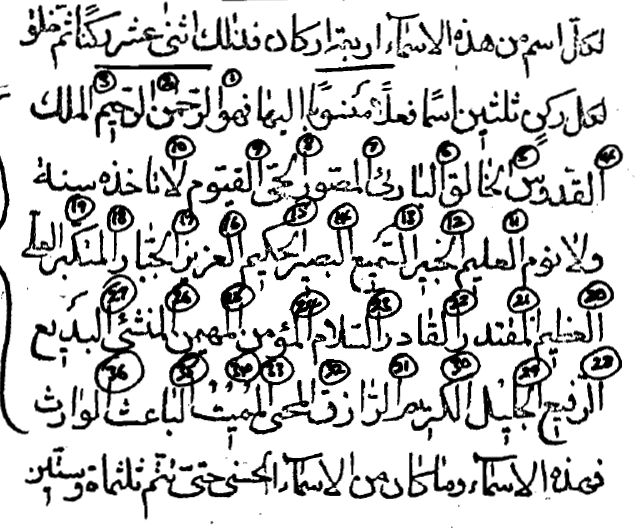אֶהְיֶה אֲשֶׁר אֶהְיֶה
EHYEH ASHER EHYEH = "I AM THAT I AM"
“And God [from the "Burning Bush" on Sinai] said unto Moses, I AM THAT I AM [ehyeh asher ehyeh] and he said, Thus shalt thou say unto the children of Israel, I AM hath sent me unto you." Exodus 3:14)” (KJV = AV).

From the Kitab al-Fihrist ("The Book of the Index", 21st June 1845) of the Bab
Somes Notes on the Names (asmā') and Attributes (ṣifāt) of God in Islamic and Babi-Baha'i Theology.
Stephen Lambden, UC Merced, 06-07-2022
In progress
In the several millennia of the history of the so-called Abrahamic religions - Judaisms-Christianities and Islamic religious and associated movements - God has many names and hundreds or rather thousands of Names (asmā', sing. ism) and Attributes (ṣifāt, sing. ṣifah). God himself has numerous personal names withn the Hebrew Bible and is characterized by many subsiduary titles, names and epithets. The same is true of the Christian God - sometimes considered identical with Jesus Himself - of the more than twenty five Greek books of the New Testament. Rooted in the over 6,000 verse Arabic Qur'an, the well-over 1,000 year old Islamic religion gives priority to the name of God Allāh (lit. `the God', cf. the Biblical Hebrew Eloah = God) though He is also considered the supreme Rabb or "Lord" and much more besides.
The religion founded and articulated by the young Sayyid `Ali Muhammad Shirazi (1819-1850) commonly known and self-designated as the Bab ( = Ar. Gate) from 1260/1844 until his execution for religious heresy on July 9th 1850, extended and supplemented Islamic theological norms in creative ways giving precedence to an apophatic view of the Ultimate Godhead beiond human understanding yet talking about hundreds of Names and Attributes. Like the Bab, Baha'u'llah wrote thousands of scriptural books and letters in Persian and Arabic again highlighting the incomprehensibility of the God beyond likeness, number and gender - One yet Ultra He-She-It- though possessed of hundreds of Names and Attributes in his knowable, cataphatic aspect. God manifests himself through the operations of Hid mashiyyat (Primal Will) through human mazhar-i ilahi, "Manifestations of God". They manifest God for the benefit of human "knowability" (`irfan, "gnosis") but keep Him hidden in His Essential Reality. The Unknown is "known" only according to human capacity by means of His Names and Attributes.
God can be said to be "One" yet is really supra-monotheistic. His "Oneness" or (Ar,) Tawhid has multi-faceted significances. For all human beings He has ever been "One" yet with a Oneness beyond numeration. The Babi-Baha'i sacred writings indicate that His "Oneness" takes on many faces, many aspects or characteristics, numerous Names and Attributes, from age of age or era to era.
Extract from the Kitab al-Fihrist (Book of the Index) of the Bab listing 36 foundational Names of God (asma Allah).
"For every Name among these Names there are four pillars (arkan) so there are [a total of] twelver pillars. Wherefore did He further creative for every pillar thirty Names. So He established a connection between them. Hence they are [1] Huwa ("He is"), [2] al-Rahman (the All-Merciful), [3] al-Rahmin (the Compassionate), [4] al-Malik (the King), [5] al-Quddus (the Sanctified- Most Holy), [6] al-Khaliq (the Creator), [7] al-Bari' (the Originator), [8] al-Musawwar (the One who Forms), [9] al-Hayy (the Living One), [10] al-Qayyum (the Self-Subsisting), [11] "Neither drowsiness (sina) nor sleep (nawm) overtakes Him" (Q. 2:255a), [12] al-`Alim (the All-Knowing), [13] al-Khabir (the Well-Acquainted), [14] al-Sami` (the Hearing), [15] al-Basir (the Seeing), [16] al-Hakim (the Wise), [17] al-`Aziz (the Mighty), [18] al-Jabbar (the All-Compelling), [19] al-Mutakabbir (the Imperious), [20] al-`Aliyy (the Exalted), [21] al-`Azim (the Mighty), [22] al-Muqtadir (the Powerful), [23] al-Qadir (the Potent), [24] al-Salam (the Peaceful), [25] al-Mu'min (the Faithful), [26] al-Muhaymin (the Help in Peril), [27] al-Munshiyy' ( the Creative), [28] al-Badi` (the Generative), [29] al-Rafi` (the Elevated), [30] al-Jalil (the Glorious), [31] al-Karim (the Noble), [32] al-Razzaq / Raziq (the Provider-Maintainor), [33] al-Muhyi (the Enlivening- Regenerator), [34] al-Mumayyit (the Causing to Die), [35] al-Ba`ith (the Resurrecting, Comissioning), [36] al-Warith (the Inheritor).
These then are the Names though not the



